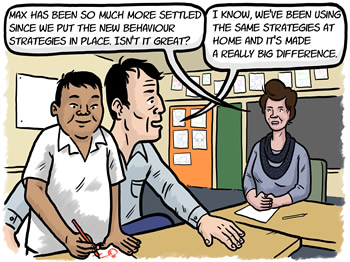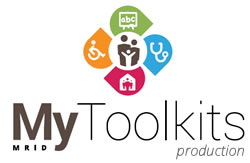The follow-up to a SchoolKit Clinic is all about communication. This means the school will talk with the health team and with the child’s family immediately after the clinic, and then again as needed to ensure that agreed strategies and actions are followed through.
Often it will be valuable for the school principal and the senior medical consultant (usually the paediatrician) to talk directly after a clinic. This conversation might involve ‘comparing notes’ on what they each observed, learned and understood about what took place during the clinic;  what were the key take-home messages of the day; and what problems came up (either in the way the clinic ran, or in the discussion of particular issues).
what were the key take-home messages of the day; and what problems came up (either in the way the clinic ran, or in the discussion of particular issues).
For positive outcomes the school principal needs to ensure that:
- The expectations of individual staff members are managed outside of the clinic.
- If necessary, a debriefing with all staff involved with the child and the family takes place after the clinic (particularly if contentious or challenging issues have arisen).
- Any follow-up learning and behavioural data is collected and shared with the appropriate health specialist.
Meanwhile, the school counsellor:
- Contacts the family to ensure that they are comfortable with the outcomes of the clinic and understand what will happen next, and what they need to do next.
- Liaises between the family and school staff as required to ensure that agreed strategies are implemented, and monitors their impact.
- Liaises and follows up with health and other allied health personnel as required.
- Liaises and follows up with counsellors, perhaps including district guidance officers, in other schools that siblings may attend, where parents have outlined issues and given their permission.
Shortly after a SchoolKit Clinic, the school will receive a copy of a letter prepared by the health team, and addressed to the family, that details the management plan agreed on during the clinic. Follow-up may be required, both within the school and with others outside the school, to ensure that the various strategies outlined have been implemented in a timely and satisfactory way.
Of course, it is essential that school staff act on any commitments that they have made during a clinic.
Monitoring Progress
The school is in a prime position to monitor the impact of all strategies put in place and maintain an ongoing dialogue with the family about progress. Doing this effectively will mean various school staff will talk with the family at different times, as they monitor the effect of their own actions and become aware of changes that may have been prompted by the actions of others.
The child’s teacher, for example, will play a key role in monitoring changes in a child’s moods and behaviour (perhaps the result of changes in medication or other health treatment plans) and will provide feedback about the effect of changes made to their strategies for engaging the child in the classroom.
The school are also in the ideal position to be able to report significant improvements and milestones in the child’s health and wellbeing and to share in celebrating these with the child and their family.




